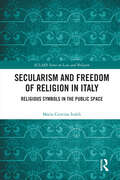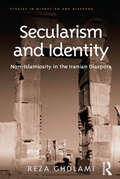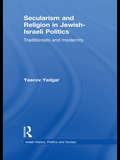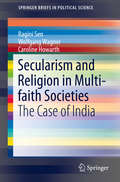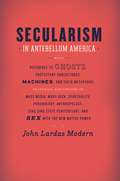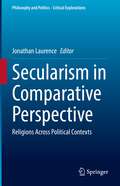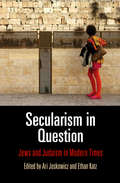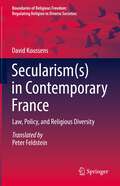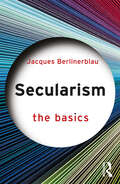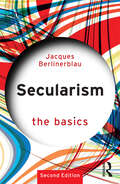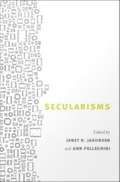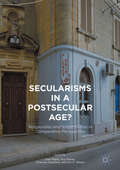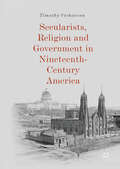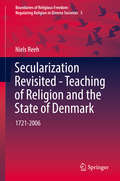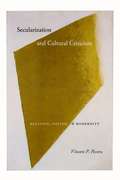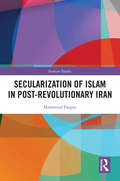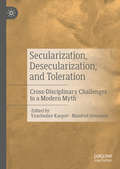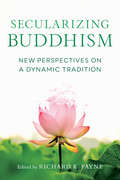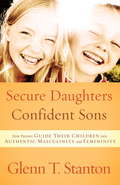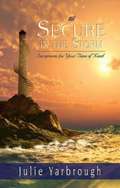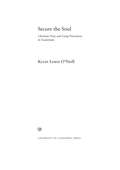- Table View
- List View
Secularism and Freedom of Religion in Italy: Religious Symbols in the Public Space (ICLARS Series on Law and Religion)
by Maria Cristina IvaldiThe display of religious symbols in the public space has been the subject of much debate. This book provides an overview of the presence of religious symbols in Italian public institutions from a legal standpoint.The situation is analysed from the perspective of the principles of laicità/secularism, as defined by the Constitutional Court, and freedom of religion. It is argued that while the display of religious symbols in public institutions has been widely investigated doctrinally, the wearing of religious symbols in Italy has generally been neglected. Key cases are examined in light of national jurisprudence as well as intervention by the European Court of Human Rights and relevant judgments from foreign courts regarding this issue. Finally, the work considers the presence of religious symbols that transcend national borders, as in the case of arts, sport and advertising. A comparison is made with the French system which takes a very different approach. The book outlines possible ways forward in light of the growing interculturality of European societies.It will be a valuable resource for academics, researchers and policy-makers working in the areas of law and religion, and comparative law.
Secularism and Identity: Non-Islamiosity in the Iranian Diaspora (Studies in Migration and Diaspora)
by Reza GholamiWithin western political, media and academic discourses, Muslim communities are predominantly seen through the prism of their Islamic religiosities, yet there exist within diasporic communities unique and complex secularisms. Drawing on detailed interview and ethnographic material gathered in the UK, this book examines the ways in which a form of secularism - ’non-Islamiosity’ - amongst members of the Iranian diaspora shapes ideas and practices of diasporic community and identity, as well as wider social relations. In addition to developing a novel theoretical paradigm to make sense of the manner in which diasporic communities construct and live diasporic identity and consciousness in a way that marginalises, stigmatises or eradicates only ’Islam’, Secularism and Identity shows how this approach is used to overcome religiously inculcated ideas and fashion a desirable self, thus creating a new space in which to live and thereby attaining ’freedom’. Calling into question notions of anti-Islamism and Islamophobia, whilst examining secularism as a means or mechanism rather than an end, this volume offers a new understanding of religion as a marker of migrant identity. As such it will appeal to scholars of sociology, anthropology and political science with interests in migration and ethnicity, diasporic communities, the sociology of religion and emerging forms of secularism.
Secularism and Religion in Jewish-Israeli Politics: Traditionists and Modernity (Israeli History, Politics and Society)
by Yaacov YadgarCommon discourse on Jewish identity in Israel is dominated by the view that Jewish Israelis can, and should, be either religious or secular. Moving away from this conventional framework, this book examines the role of secularism and religion in Jewish society and politics. With a focus on the ‘traditionists’ (masortim) who comprise over a third of the Jewish-Israeli population, the author examines issues of religion, tradition and secularism in Israel, giving a fresh approach to the widening theoretical discussion regarding the thesis of secularisation and modernity and exploring the wider implications of this identity. Yadgar’s conclusions have significant social, cultural and political implications, serving not only as a new contribution to the academic discourse on Jewish-Israeli identity, but as a platform upon which traditionist positions on central issues of Israeli politics can be heard. Offering a detailed investigation into a central and important Jewish-Israeli identity construct, the book is relevant not only to the study of Jewish identity in Israel but also within the wider social-theoretical issues of religion, tradition, modernity and secularization. The book will be of great interest to students of Israeli society and to anyone looking into the issues of Jewish identity, Israeli nationalism and ethnicity, religion and politics in Israel, and the sociology of religion.
Secularism and Religion in Multi-faith Societies
by Ragini Sen Wolfgang Wagner Caroline HowarthThis Brief looks at the illustrative case of the Hindu-Muslim conflict in India, with the aim of understanding the dynamics of lived secularism as it exists in traditional multi-faith societies such as India. The data analyzed in this Brief comprise many interviews, conducted amidst Hindus and Muslims, with respondents of both sexes living in slum and middle class regions in the city of Mumbai. The volume begins by giving a brief summary of the historical and cultural background to the present situation in India. It then traces complementarities and similarities of opinions across diverse constituencies which cluster around three main anchoring points: communication, re-presentations and operationalizing of a shared dream. The first point explores the need to understand and to be understood, encourages processes of mutual acculturation, and describes the sensitive decoding of cultural symbols such as dress codes. The second point discusses changes in mind sets and mutual perceptions, where Muslims and Islam are portrayed in a balanced way and exploitation of religion for political purposes is stopped. The third main point is the involvement of the common, regular person, and a focus on children, as the unifying hope for the future. Throughout the volume, emphasis is on moral maturation, cultural interpretation in lieu of cultural imposition and creation of a sensitive media policy. The issues raised may help craft interdisciplinary and international frameworks, which address conflict resolution in culturally diverse multi-faith societies. Accordingly, the book concludes with policy recommendations for supporting the peaceful coexistence of secularism and religion in society from a peace psychological perspective.
Secularism and Religion in Nineteenth-Century Germany
by Todd H. WeirNegotiating the boundaries of the secular and of the religious is a core aspect of modern experience. In mid-nineteenth-century Germany, secularism emerged to oppose church establishment, conservative orthodoxy, and national division between Catholics, Protestants, and Jews. Yet, as historian Todd H. Weir argues in this provocative book, early secularism was not the opposite of religion. It developed in the rationalist dissent of Free Religion and, even as secularism took more atheistic forms in Freethought and Monism, it was subject to the forces of the confessional system it sought to dismantle. Similar to its religious competitors, it elaborated a clear worldview, sustained social milieus, and was integrated into the political system. Secularism was, in many ways, Germany's fourth confession. While challenging assumptions about the causes and course of the Kulturkampf and modern antisemitism, this study casts new light on the history of popular science, radical politics, and social reform.
Secularism in Antebellum America (Religion And Postmodernism Ser.)
by John Lardas ModernGhosts. Railroads. Sing Sing. Sex machines. These are just a few of the phenomena that appear in John Lardas Modern’s pioneering account of religion and society in nineteenth-century America. This book uncovers surprising connections between secular ideology and the rise of technologies that opened up new ways of being religious. Exploring the eruptions of religion in New York’s penny presses, the budding fields of anthropology and phrenology, and Moby-Dick, Modern challenges the strict separation between the religious and the secular that remains integral to discussions about religion today. Modern frames his study around the dread, wonder, paranoia, and manic confidence of being haunted, arguing that experiences and explanations of enchantment fueled secularism’s emergence. The awareness of spectral energies coincided with attempts to tame the unruly fruits of secularism—in the cultivation of a spiritual self among Unitarians, for instance, or in John Murray Spear’s erotic longings for a perpetual motion machine. Combining rigorous theoretical inquiry with beguiling historical arcana, Modern unsettles long-held views of religion and the methods of narrating its past.
Secularism in Comparative Perspective: Religions Across Political Contexts (Philosophy and Politics - Critical Explorations #23)
by Jonathan LaurenceThis book confronts the key questions surrounding comparative secularism in historical perspective. The contributions critically consider the normative ideas and alternative political arrangements that govern religion’s relation to politics and to the public and private spheres. Containing contributions by world-renowned scholars such as Michael Walzer, Asma Afsaruddin and Sudipta Kaviraj, this book recounts the arguments, debates, and disputations regarding secular arguments for accommodating religion. It does so in both critical and appreciative ways and describes some of the outcomes in actually existing institutions, policies, and practical arrangements. With the addition of many non-Western experiences and viewpoints on how secularism is theorized and lived, politically and historically and from Europe and Asia to Africa and the Americas, this volume is of great value political philosophers across the globe.
Secularism in Question: Jews and Judaism in Modern Times (Jewish Culture and Contexts)
by Ari Joskowicz Ethan B. KatzFor much of the twentieth century, most religious and secular Jewish thinkers believed that they were witnessing a steady, ongoing movement toward secularization. Toward the end of the century, however, as scholars and pundits began to speak of the global resurgence of religion, the normalization of secularism could no longer be considered inevitable. Recent decades have seen the strengthening of Orthodox movements in the United States and in Israel; religious Zionism has grown and radically changed since the 1960s, and new and vibrant nondenominational Jewish movements have emerged.Secularism in Question examines the ways these contemporary revivals of religion prompt a reconsideration of many issues concerning Jews and Judaism from the early modern era to the present. Bringing together scholars of history, religion, philosophy, and literature, this volume illustrates how the categories of "religious" and "secular" have frequently proven far more permeable than fixed. The contributors challenge the problematic assumptions about the development of secularism that emerge from Protestant European and American perspectives and demonstrate that global Jewish experiences necessitate a reappraisal of conventional narratives of secularism. Ultimately, Secularism in Question calls for rethinking the very terms that animate many of the most contentious debates in contemporary Jewish life and far beyond.Contributors: Michal Ben-Horin, Aryeh Edrei, Jonathan Mark Gribetz, Ari Joskowicz, Ethan B. Katz, Eva Lezzi, Vivian Liska, Rachel Manekin, David Myers, Amnon Raz-Krakotzkin, Andrea Schatz, Christophe Schulte, Daniel B. Schwartz, Galili Shahar, Scott Ury.
Secularism, Identity, and Enchantment
by Akeel BilgramiBringing clarity to a subject clouded by polemic, Secularism, Identity, and Enchantment is a rigorous exploration of how secularism and identity emerged as concepts in different parts of the modern world. At a time when secularist and religious worldviews appear irreconcilable, Akeel Bilgrami strikes out on a path distinctly his own, criticizing secularist proponents and detractors, liberal universalists and multicultural relativists alike.<P><P> Those who ground secularism in arguments that aspire to universal reach, Bilgrami argues, fundamentally misunderstand the nature of politics. To those, by contrast, who regard secularism as a mere outgrowth of colonial domination, he offers the possibility of a more conceptually vernacular ground for political secularism. Focusing on the response to Salman Rushdie's Satanic Verses, Bilgrami asks why Islamic identity has so often been a mobilizing force against liberalism, and he answers the question with diagnostic sympathy, providing a philosophical framework within which the Islamic tradition might overcome the resentments prompted by its colonized past and present.<P> Turning to Gandhi's political and religious thought, Bilgrami ponders whether the increasing appeal of religion in many parts of the world reflects a growing disillusionment not with science but with an outlook of detachment around the rise of modern science and capitalism. He elaborates a notion of enchantment along metaphysical, ethical, and political lines with a view to finding in secular modernity a locus of meaning and value, while addressing squarely the anxiety that all such notions hark back nostalgically to a time that has past.
Secularism, Islam and Modernity
by M T Ansari Syed Alam KhundmiriSyed Alam Khundmiri (1922-83) was an important intellectual figure of his times, a true humanist with rare philosophical insights ranging over a wide field. The volume brings together Khundmiri's seminal essays which set out his dominant concerns: Marxism, with its indifference to questions of minorities in nationalism; existentialism, which he saw as being closed off to the problems of community; and Islam, which he examined in relation to history and notions of time and change. Overall, this absorbing collection of essays encapsulates Khundmiri's dual project of situating Islam in the modern context and scrutinizing the modern in the light of Islam. Particularly relevant in the present context of the increasing sacralization of politics, it will be read with great interest by students and scholars of philosophy, history, sociology, Islamic studies, Marxism, comparative religion, cultural studies, and political and social theory, as well as by the aware and concerned lay reader.
Secularism: Law, Policy, and Religious Diversity (Boundaries of Religious Freedom: Regulating Religion in Diverse Societies)
by David KoussensThe increasing visibility of Islam in France and the vehemence of debates about it have often contributed to narrow public perceptions of secularism to a simplistic antireligious crusade, a misleading image disseminated by the media and politicians alike. Taking the opposite stand, this book embarks on a comprehensive effort to document the multiple areas in which French secularism plays out - in debates over “cults,” places of worship, chaplaincy services in public institutions, the recognition of associations of worship, and more -, outlining and analizing the legal paths favored by the state in the regulation of religious diversity. While Islam has undoubtedly contributed to the reshaping of French secularism in the last decades, the book moves beyond what has come to be known as the "Muslim Question" to look at the multiplicity of challenges contemporary religious beliefs, practices, and organizations now pose to the state. David Koussens examines the main political and legal configurations of French secularism over the last thirty years through a sociological and juridical lens, in order to better document its diversity. Such a portrait emphasizes that French secularism is not a univocal phenomenon but one that appears in many guises.
Secularism: The Basics (The Basics)
by Jacques BerlinerblauSecularism: The Basics is a concise and engaging introduction to confusing and contradictory public discussions of secularism across the globe. “Secularism” must be the most confused and convoluted term in the entire global political lexicon. From New York to Paris, to Istanbul, to Addis Ababa, to New Delhi, to Montevideo, there are countless examples of politicians, religious leaders and journalists, invoking the S-word in heated debates about public education, gender, sex, national symbols, and artistic freedom. In this lively and lucid book, Jacques Berlinerblau addresses why secularism is defined in so many ways and why it so ignites people’s passions. In so doing, he explores the following important questions: What does secularism mean? Why should we care about this idea? What are the different types of secularism and what are their histories? What are the basic principles of political secularisms? Why are secularism and Atheism often confused? What is the relationship between secularism and LGBTQ rights? What opposition are secularisms up against? What does the future hold for a concept millennia in the making, but only really operationalized in the twentieth century? With a glossary of key terms, case studies, informative tables, and suggestions for further reading throughout, the book considers key philosophical, religious, anti-religious, post-modern and post-colonial arguments around secularism. This book is an ideal starting point for anyone seeking a readable introduction to the often-conflicting interpretations of one of our era’s most complex and controversial ideas.
Secularism: The Basics (The Basics)
by Jacques BerlinerblauSecularism: The Basics is a concise and engaging introduction to confusing and contradictory public discussions of secularism across the globe. In this lively and lucid book, Jacques Berlinerblau addresses why secularism is defined in so many ways and why it so ignites people’s passions. In so doing, he explores the following important questions: What does secularism mean? Why should we care about this idea? What are the different types of secularism and what are their histories? What are the basic principles of political secularisms? Why are secularism and Atheism often confused? What is the relationship between secularism and LGBTQ rights? What opposition are secularisms up against? What does the future hold for a concept millennia in the making, but only really operationalized in the last century and a half? This thoroughly updated new edition includes two new chapters on African Secularisms and the importance of Mexico in the history of political secularism. With a glossary of key terms, new and updated case studies throughout, informative tables, and suggestions for further reading, the book considers key philosophical, religious, anti-religious, and post-colonial arguments around secularism. This book continues to be an ideal starting point for anyone seeking a readable introduction to the often-conflicting interpretations of one of our era’s most complex and controversial ideas.
Secularisms
by Ann Pellegrini Janet R. JakobsenAt a time when secularism is put forward as the answer to religious fundamentalism and violence, Secularisms offers a powerful, multivoiced critique of the narrative equating secularism with modernity, reason, freedom, peace, and progress. Bringing together essays by scholars based in religious studies, gender and sexuality studies, history, science studies, anthropology, and political science, this volume challenges the binary conception of "conservative" religion versus "progressive" secularism. With essays addressing secularism in India, Iran, Turkey, Great Britain, China, and the United States, this collection crucially complicates the dominant narrative by showing that secularism is multifaceted. How secularism is lived and experienced varies with its national, regional, and religious context. The essays explore local secularisms in relation to religious traditions ranging from Islam to Judaism, Hinduism to Christianity. Several contributors explicitly take up the way feminism has been implicated in the dominant secularization story. Ultimately, by dislodging secularism's connection to the single (and singular) progress narrative, this volume seeks to open spaces for other possible narratives about both secularism and religion--as well as for other possible ways of inhabiting the contemporary world. Contributors: Robert J. Baird, Andrew Davison, Tracy Fessenden, Janet R. Jakobsen, Laura Levitt, Molly McGarry, Afsaneh Najmabadi, Taha Parla, Geeta Patel, Ann Pellegrini, Tyler Roberts, Ranu Samantrai, Banu Subramaniam, Rajeswari Sunder Rajan, Angela Zito
Secularisms in a Postsecular Age?
by Erin K. Wilson Ruy Blanes José Mapril Emerson GiumbelliThis volume ethnographically explores the relation between secularities and religious subjectivities. As a consequence of the demise of secularization theory, we live in an interesting intellectual moment where the so-called 'post-secular' coexists with the secular, which in turn has become pluralized and historicized. This cohabitation of the secular and post-secular is revealed mainly through political dialectical processes that overshadow the subjective and inter-subjective dimensions of secularity, making it difficult to pinpoint concrete sites, agents, and objects of expression. Drawing on cases from South America, Africa, and Europe, contributors apply key insights from religious studies debates on the genealogies and formations of both religion and secularism. They explore the spaces, persons, and places in which these categories emerge and mutually constitute one another.
Secularists, Religion and Government in Nineteenth-Century America
by Timothy VerhoevenThis book shows how, through a series of fierce battles over Sabbath laws, legislative chaplains, Bible-reading in public schools and other flashpoints, nineteenth-century secularists mounted a powerful case for a separation of religion and government. Among their diverse ranks were religious skeptics, liberal Protestants, members of minority faiths, labor reformers and defenders of slavery. Drawing on popular petitions to Congress, a neglected historical source, the book explores how this secularist mobilization gathered energy at the grassroots level. The nineteenth century is usually seen as the golden age of an informal Protestant establishment. Timothy Verhoeven demonstrates that, far from being crushed by an evangelical juggernaut, secularists harnessed a range of cultural forces—the legacy of the Revolutionary founders, hostility to Catholicism, a belief in national exceptionalism and more—to argue that the United States was not a Christian nation, branding their opponents as fanatics who threatened both democratic liberties as well as true religion.
Secularization Revisited - Teaching of Religion and the State of Denmark
by Niels ReehSince 2001, history has proven the classic and once dominant theories of secularization wrong. Instead of abandoning the subject of secularization, Niels Reeh's Secularization Revisited demonstrates how the collapse of formerly dominant secularization theories indicates fundamental conceptual challenges within sociology. Through a historical sociological case study of the political decision-making concerning the teaching of religion in Denmark from 1721 to 2006, Reeh explains why sociology of religion and sociology more generally should pay more attention to interstate relations, state-form and state-agency. The Danish state's interest in its inhabitants' religion over the last three centuries responded not only to religious motives but to concerns about foreign relations and the survival of the state.
Secularization and Cultural Criticism: Religion, Nation, and Modernity (Religion and Postmodernism)
by Vincent Pecora<p>Religion is an undiscovered country for much of the secular academy, which remains deeply ambivalent about it as an object of study. On the one hand, secular scholars agree that it is time to take religion seriously. On the other, these same scholars persist in assuming that religion rests not on belief but on power and ideology. According to Vincent Pecora, the idea of the secular itself is the source of much of the contradiction and confusion in contemporary thought about religion. Pecora aims here to work through the paradoxes of secularization, which emerges in this book as an intractable problem for cultural criticism in the nation-states of the post-Enlightenment West. <p>Secularization and Cultural Criticism examines the responses of a wide range of thinkers—Edward Said, Talal Asad, Jürgen Habermas, Walter Benjamin, Emile Durkheim, Carl Schmitt, Matthew Arnold, and Virginia Woolf, among others—to illustrate exactly why the problem of secularization in the study of society and culture should matter once again. Exploring the endemic difficulty posed by religion for the modern academy, Pecora makes sense of the value and potential impasses of secular cultural criticism in a global age.</p>
Secularization of Christianity
by E. L. MascallAn Anglican perspective on changes in modern Christianity
Secularization of Islam in Post-Revolutionary Iran (Iranian Studies)
by Mahmoud PargooExamining the trajectory of the secularization of Islam in Iran, this book explains how efforts to Islamize society led, self-destructively, to its secularization. The research engages a range of debates across different fields, emphasizing the political and epistemological instability of the basic categories such as Islam, Sharia, and secularism. The volume is an interdisciplinary study of both the history of Islamic revival and Khomeini’s very specific merger of Islamic law and mysticism. It traces back the process of secularization to the early encounter of Iranian intellectuals with Europeans and adoption of their fundamental framework in an Islamic guise. The process continued until the Islamic Revolution of Iran in 1979, when Khomeini tried to substantively de-secularize Iranian social imaginaries. His attempts were not followed up by his followers, who vigorously reinstated the previous trend, after his death, resulting in a polity that is mostly secular but with Islamic ornaments. Bringing together area studies (Iran), religious studies (Islam), and political theory (secularism), this interdisciplinary volume places findings in a broader narrative that is both specific to Iran and broad enough to engage a global readership.
Secularization, Desecularization, and Toleration: Cross-Disciplinary Challenges to a Modern Myth
by Manfred Svensson Vyacheslav KarpovThis book challenges the modern myth that tolerance grows as societies become less religious. The myth inseparably links the progress of toleration to the secularization of modern society. This volume scrutinizes this grand narrative theoretically and empirically, and proposes alternative accounts of the varied relationships between diverse interpretations of religion and secularity and multiple secularizations, desecularizations, and forms of toleration. The authors show how both secular and religious orthodoxies inform toleration and persecution, and how secularizations and desecularizations engender repressive or pluralistic regimes. Ultimately, the book offers an agency-focused perspective which links the variation in toleration and persecution to the actors of secularization and desecularization and their cultural programs.
Secularizing Buddhism: New Perspectives on a Dynamic Tradition
by Edited by Richard PayneA timely essay collection on the development and influence of secular expressions of Buddhism in the West and beyond. How do secular values impact Buddhism in the modern world? What versions of Buddhism are being transmitted to the West? Is it possible to know whether an interpretation of the Buddha&’s words is correct? In this new essay collection, opposing ideas that often define Buddhist communities—secular versus religious, modern versus traditional, Western versus Eastern—are unpacked and critically examined. These reflections by contemporary scholars and practitioners reveal the dynamic process of reinterpreting and reimagining Buddhism in secular contexts, from the mindfulness movement to Buddhist shrine displays in museums, to whether rebirth is an essential belief. This collection explores a wide range of modern understandings of Buddhism—whether it is considered a religion, philosophy, or lifestyle choice—and questions if secular Buddhism is purely a Western invention, offering a timely contribution to an ever-evolving discussion. Contributors include Bhikkhu Bodhi, Kate Crosby, Gil Fronsdal, Kathleen Gregory, Funie Hsu, Roger R. Jackson, Charles B. Jones, David L. McMahan, Richard K. Payne, Ron Purser, Sarah Shaw, Philippe Turenne, and Pamela D. Winfield.
Secure Daughters, Confident Sons
by Glenn T. StantonRaise secure, confident kids in a gender-confused worldFrom the moment someone first asked "Boy or girl?" every child's identity is tied to his or her gender. But how that identity fully takes shape depends greatly on the influence of their parents and what they teach their children about the innate value of being male or female. In this eye-opening book, family researcher Glenn T. Stanton offers a clear vision for why gender matters in how we raise our children. His thought-provoking insights expose the problems with stifling stereotypes and damaging cultural assumptions, then highlight a practical pathway for guiding children into healthy manhood and womanhood. You'll discover... · what gender-appropriate behavior looks like at various ages--and why you shouldn't panic if your toddler boy plays with his sister's dolls. · how to help your daughter become secure in her sense of significance--whether she prefers chasing butterflies or shooting hoops. · how to inspire your son to compete and take healthy risks--in ways that fit his unique personality. · how moms and dads complement one another as they discipline differently, comfort differently, and influence differently. · what you can do on a daily basis to nurture your children's God-given design and help them resist the pressure to conform to arbitrary cultural rules. With practical tools, well-researched insights, and real-life scenarios, this book equips parents to launch daughters who are secure in the power of their femininity and sons who are confident in their strength to make a difference in the world.
Secure in the Storm: Scriptures For Your Time of Need
by Julie YarbroughThis pocket sized book is a beautiful collection of Scripture verses offering comfort and hope to anyone who is experiencing a time of loss or discouragement. Over 150 promises from the Word of God are conveniently organized into seven categories for quick and easy searching: Assurance Comfort Encouragement Faith Hope Love Peace These encouraging Scriptures will strengthen and sustain those who have lost a loved one or suffered some other kind of loss or personal difficulty, reminding them of the steadfast love and faithfulness of God. A perfect gift for anyone who is grieving or struggling with discouragement.
Secure the Soul: Christian Piety and Gang Prevention in Guatemala
by Kevin Lewis O'Neill"I'm not perfect," Mateo confessed. "Nobody is. But I try. " Secure the Soul shuttles between the life of Mateo, a born-again ex-gang member in Guatemala and the gang prevention programs that work so hard to keep him alive. Along the way, this poignantly written ethnography uncovers the Christian underpinnings of Central American security. In the streets of Guatemala City--amid angry lynch mobs, overcrowded prisons, and paramilitary death squads--millions of dollars empower church missions, faith-based programs, and seemingly secular security projects to prevent gang violence through the practice of Christian piety. With Guatemala increasingly defined by both God and gangs, Secure the Soul details an emerging strategy of geopolitical significance: regional security by way of good Christian living.
